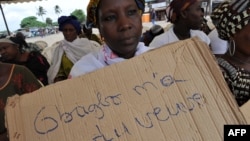ABIDJAN —
Campaigning is underway in Ivory Coast for municipal and regional elections, although the opposition party of former president Laurent Gbagbo has vowed to boycott. The country’s U.N. peacekeeping mission is warning against intimidation and threats of violence surrounding the April 21 vote.
The election later this month is seen as an important test of whether Ivory Coast has moved past its recent electoral turmoil. Following the November 2010 presidential election, former president Laurent Gbagbo refused to concede defeat to the winner, Alassane Ouattara. The standoff between the two triggered five months of violence that claimed at least 3,000 lives.
The former president's political party, the Ivorian Popular Front, boycotted legislative elections in late 2011. Though the vote went smoothly, turnout was low and there were isolated attacks on polling stations.
Earlier this year, the Ivorian Popular Front held talks with the governing coalition about participating in the upcoming polls. But Richard Kodjo, the party’s secretary-general, said it pulled out because the coalition had set a date for the elections without proper consultations.
"We were in the middle of these negotiations, and we had not reached any conclusions, but the authorities decided to fix the date anyway," he said. “We had hoped that we would not go forward with the elections until we had solved the problems of security and credibility.”
Kodjo explained the party was hoping for reforms to the security sector, as well as the national election commission, which he claimed was not capable of managing a fair vote.
The party is also seeking amnesty for crimes committed during the 2010-11 conflict, something President Ouattara’s government has ruled out.
An emerging markets strategist at Standard Bank, Samir Gadio, said the Ivorian Popular Front decision to boycott is probably motivated by a fear of defeat, as well as by “hardcore elements” in the party who have little interest in cooperating with the government.
“By going to this election they will probably lose, which they know. The second point is that the leadership of the FPI at the moment is still unable to draw its own direction. In a sense it is still influenced by hardcore elements, which are not keen to reintegrate in the political process,” said Gadio.
Unlike recent presidential and parliamentary elections, the local elections will not be U.N. organized. At a recent press conference, Albert Koenders, the U.N. special representative in Ivory Coast, said he was confident local authorities are doing everything in their power to ensure a smooth and fair vote.
He also issued a stern warning to potential spoilers.
“Aspirants calling for hatred, violence, intolerance and intimidation that threaten the peaceful execution of these elections should know that they will be responsible for their actions," Koenders said, adding that the United Nations will be particularly vigilant against all threats.
According to the election commission, more than 700 candidates will take part in the vote. A total of 659 will be running for municipal seats, while 84 will be running for regional positions.
The election later this month is seen as an important test of whether Ivory Coast has moved past its recent electoral turmoil. Following the November 2010 presidential election, former president Laurent Gbagbo refused to concede defeat to the winner, Alassane Ouattara. The standoff between the two triggered five months of violence that claimed at least 3,000 lives.
The former president's political party, the Ivorian Popular Front, boycotted legislative elections in late 2011. Though the vote went smoothly, turnout was low and there were isolated attacks on polling stations.
Earlier this year, the Ivorian Popular Front held talks with the governing coalition about participating in the upcoming polls. But Richard Kodjo, the party’s secretary-general, said it pulled out because the coalition had set a date for the elections without proper consultations.
"We were in the middle of these negotiations, and we had not reached any conclusions, but the authorities decided to fix the date anyway," he said. “We had hoped that we would not go forward with the elections until we had solved the problems of security and credibility.”
Kodjo explained the party was hoping for reforms to the security sector, as well as the national election commission, which he claimed was not capable of managing a fair vote.
The party is also seeking amnesty for crimes committed during the 2010-11 conflict, something President Ouattara’s government has ruled out.
An emerging markets strategist at Standard Bank, Samir Gadio, said the Ivorian Popular Front decision to boycott is probably motivated by a fear of defeat, as well as by “hardcore elements” in the party who have little interest in cooperating with the government.
“By going to this election they will probably lose, which they know. The second point is that the leadership of the FPI at the moment is still unable to draw its own direction. In a sense it is still influenced by hardcore elements, which are not keen to reintegrate in the political process,” said Gadio.
Unlike recent presidential and parliamentary elections, the local elections will not be U.N. organized. At a recent press conference, Albert Koenders, the U.N. special representative in Ivory Coast, said he was confident local authorities are doing everything in their power to ensure a smooth and fair vote.
He also issued a stern warning to potential spoilers.
“Aspirants calling for hatred, violence, intolerance and intimidation that threaten the peaceful execution of these elections should know that they will be responsible for their actions," Koenders said, adding that the United Nations will be particularly vigilant against all threats.
According to the election commission, more than 700 candidates will take part in the vote. A total of 659 will be running for municipal seats, while 84 will be running for regional positions.









